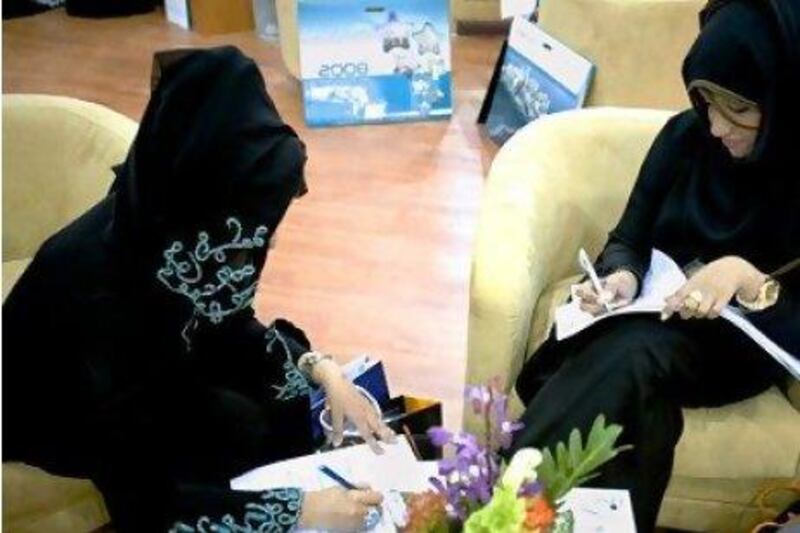It is not surprising that the recent push by the Abu Dhabi Government to appoint 6,000 nationals to civil service positions has received media coverage beyond UAE frontiers.
After all, as noted by the Financial Times, a legion of expatriate advisers working at government desks are facing the prospect of being told that their services are no longer needed.
However, one should not forget that their jobs, salaries and associated perks were always destined to be temporary.
Invited at the beginning by Sheikh Zayed, the late President of the UAE, to help build the infrastructure and administration of the country, foreign consultants are essentially on a mission to make themselves redundant by supporting local initiatives to build capacity in their host country.
This mission now looks close to being accomplished, and their usefulness is trumped by other policy priorities. Media attention on the Government's push cannot obscure that the success of the country's Emiratisation policy will be decided in the private sector.
While UAE nationals already account for 60 to 70 per cent of federal and local government employment, they represent only 4 to 5 per cent of the private-sector workforce.
With unemployment among nationals still high at about 13 per cent and a government sector now approaching saturation, attracting more nationals into private business will become the priority.
The promotion of local entrepreneurship through the Khalifa Fund is an important initiative in this respect as successful entrepreneurs become role models who inspire the young generation to grow and diversify the economy through private initiative.
Yet, to increase the share of nationals in the private sector, a few well-documented challenges need to be overcome.
It is often said that young Emirati graduates are wary of competing with expatriates for private-sector jobs as businesses seem to prefer candidates who will have strong links of dependency with the employer through visa sponsorship and the need to make a living.
Young nationals also come with a different set of skills and motivation that businesses have not yet fully understood. In this context, Emiratisation quotas have been perceived by many businesses as a form of hidden taxation.
Compelled to hire nationals, some companies have resorted to creating a parallel workforce that is largely left to its own devices.
Making a mockery of the intended objective of Emiratisation, which is to employ more UAE citizens "in a meaningful and efficient manner", this sort of arrangement will hardly inspire Emirati graduates to seek careers in the private sector.
From a strict business perspective, this is strategic nonsense, as Emirati graduates have unique skills to offer that cannot be found in the expatriate workforce.
Who else could help businesses understand the needs and expectations of 1 million Emirati customers, representing a large share of the country's purchasing power?
Who would be better equipped to guide businesses through regulatory processes and build relationships with government departments?
All research shows that employee engagement is a key performance driver for any organisation - as is well-managed diversity.
Employee engagement does not come through dependency on visa sponsorship - which ensures employee compliance - but through addressing individual motivational drivers.
Therefore, businesses do not have much to lose from increasing their Emirati workforce - over which they might feel less in control but from which they have much to gain.
Research published recently in the Harvard Business Review demonstrates that nothing boosts employee motivation during the workday as much as making progress in meaningful work - which resonates well with the objective of Emiratisation to employ UAE citizens in a meaningful and efficient way.
In other words, making a business attractive to Emirati graduates can be a catalyst for wider organisational change that creates real engagement of all employees, leading to higher performance and staff retention.
Etisalat, one of the largest employers of nationals, has noticed that young Emirati graduates have become more interested in professional development opportunities than in pay and benefits. Having taught many Emirati professionals in executive education programmes in Abu Dhabi, this does not surprise me. Young graduates and employees care a lot about their development - as much as they care about building their country.
No finer example has been set than by the late Sheikh Ahmed bin Zayed, who worked at the Abu Dhabi Investment Authority (Adia) for six years as an equity analyst side-by-side with his colleagues on an open floor to learn the "nuts and bolts" of the business before being appointed chief executive. Under his leadership, Adia became known not only as one of the largestinvestors worldwide but also one of the best.
The UAE is a young and dynamic country with talent in abundance. Making the best use of it is simply good business sense.
A Stephan Schubert is a professor of entrepreneurship at Insead Business School, Abu Dhabi campus





